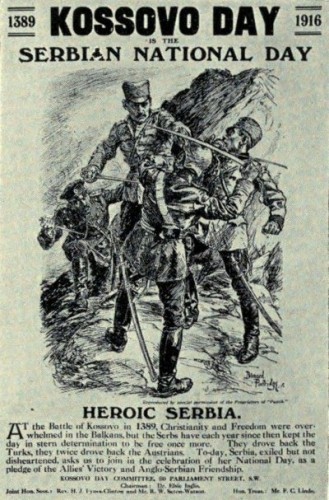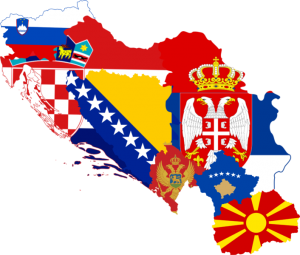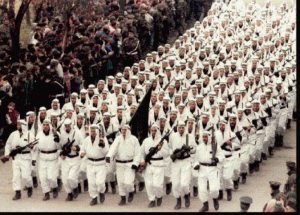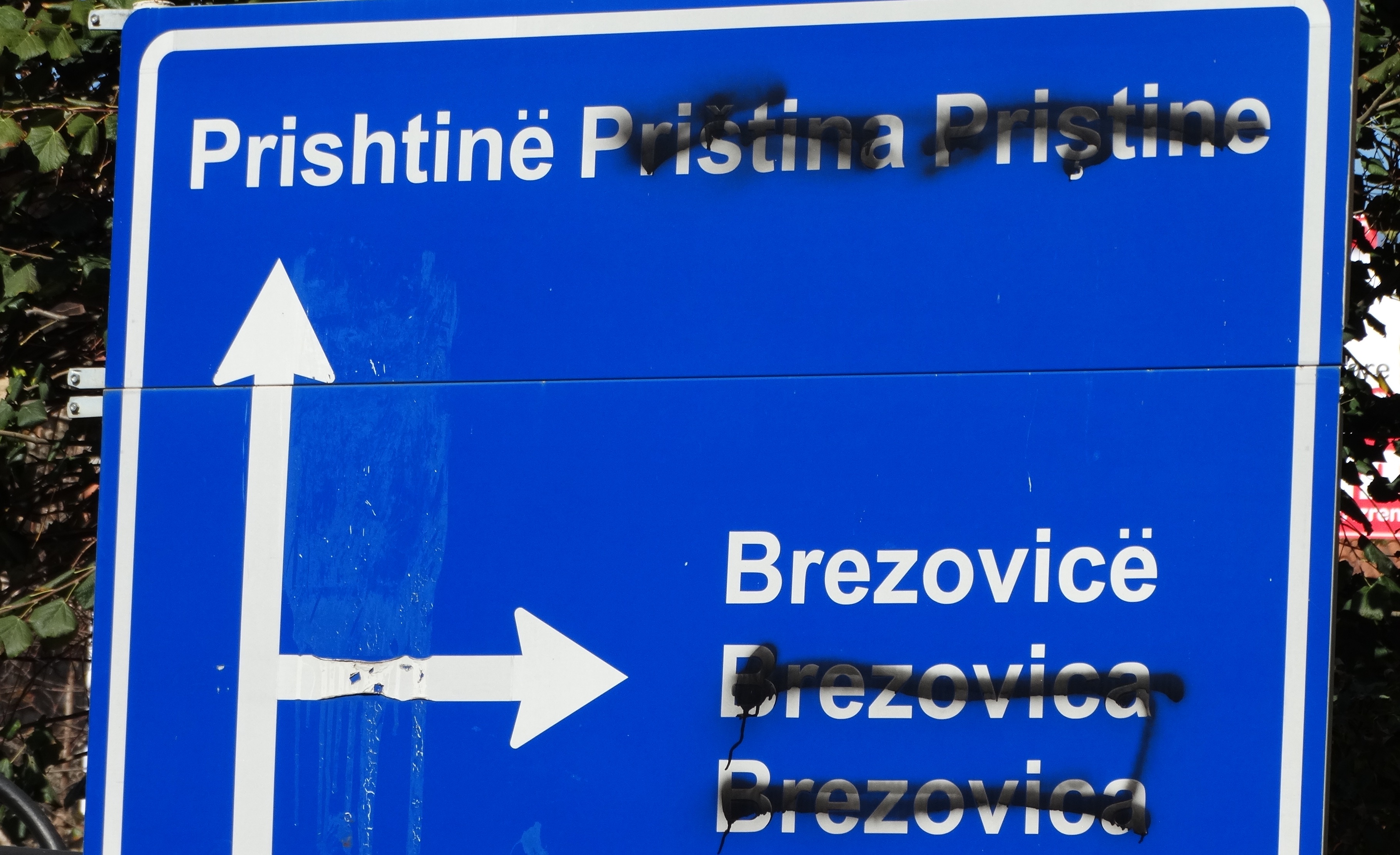
Views: 708

Every now and then we are being bombed by some terms in order to get used to them and accept them as something regular, accurate and correct. Such a thing happened with the toponym of Kosovo.
The same method was applied in Bosnia and Herzegovina, i.e with the toponym of Bosnia, which once was an Orthodox Christian medieval kingdom, meanwhile global media portrays it as it’s exclusively Bosnian Muslim land regardless the fact that history, old books speak differently. In that sense here are the facts easy to check:
Encyclopedia Britannica, Edition 1971
Reference: EB, Edition 1971, Volume 3, page 983, Entry: Bosnia, history
(Quote)
SERBIAN SETTLEMENT IN BOSNIA-HERZEGOVINA BEGAN IN THE SEVENTH CENTURY A.D.
(End quote)
Note: Croats settled much later and in insignificant numbers. That is why they are not mentioned much in the literature.
Encyclopedia Britannica, Edition 1990
Reference: EB, Edition 1990, Volume 29, Macropedia, page 1098, Entry: Yugoslavia, Bosnia and Herz.
(Quote)
THE EMPEROR CONSTANTINE VII PORPHYROGENITUS (reigned 913-957) REFERRED TO BOSNIA AS PART OF *THE LAND OF THE SERBS*.
Collier’s Encyclopedia, Edition 1956
Reference: Collier’s Encyclopedia P.F. Collers & Sons Corporation Volume 19, Edition 1956, YUGOSLAVIA, … Ethnology and Population, page 661
(Quote)
BOSNIA-HERCEGOVINA… THE LARGEST SINGLE NATIONAL ELEMENT IS THE ORTHODOX SERBS, followed by Moslem Slavs (few of whom can trace their origin to Turkish colonists) and Catholic Croats…
…The republics of Croatia and Slovenia are predominantly Roman Catholic, while the republics of Serbia, Macedonia, Montenegro, and BOSNIA-HERCEGOVINA (!!!) are predominantly ORTHODOX
(End quote)
After the digression, let’s return to the Kosovo case. Kosovo is a part of a sovereign, old European state, Serbia. It’s scandalous and makes no sense to use the name of the region for establishing another Albanian state, inhabited by ethnic Albanians who flooded the place first with the Ottomans as a part of their armed forces, later with Hitler as his ally, during the Tito rule, and finally after three months of NATO aggression on Serbia.

The poet Milan Rakic, while writing the lyrics to the Kosovo heroes, sang about those who defeated the same those who grabbed the name of Kosovo:
“Kosovo heroes, merit your
last best. In bloody horror,
When the rotten realm of arms swings,
Every corpse is a conscious victim, a true hero. ”
Today, according to global media (and even some Serbian), the “ Kosovo heroes ” would have been Bitici, Thaci, Haradinaj and Albanian terrorists. All Albanians, just not Serbs – same those who, while in the service of another force were defeated by true Kosovo heroes.
On 28 June 1916, Britain commemorated Kossovo Day. The Manchester Guardian reports:
“In all the strange developments of wartime, there can hardly be anything of such curious significance as Kossovo Day as it is being kept this year. That in London and Manchester and other English cities people should meet and demonstrate in memory of a battle which occurred in The Balkans 527 years ago – here surely is an extraordinary thing”.
So what was this extraordinary thing? Kossovo Day, 28 June, to the Serbian people is the day when they commemorate the Battle of Kossovo between the Serbs and the Turks which took place on the Plain of Kossovo in 1389. Although the battle ended in a stalemate, the Turks had a larger surviving army than the Serbs. As a result, Serbia gradually became absorbed into the Ottoman Empire and the Serbian people always commemorated 28 June in the hope that one day they would once again be free of the Ottoman Empire.
During World War I Britain had come to admire Serbia. In autumn/winter 1914 the Serbs defeated the Austrians in three battles. Links with Serbia which had started during the first two Balkan Wars in 1912 and 1913 were cemented. The Serbian Relief Fund was set up by academic Robert Seton-Watson and others and had the support of many influential people, the Queen agreed to be a patron.
The Scottish Women’s Hospitals was founded by Dr Elsie Inglis, a Scottish doctor, and drew its support from local Suffrage Societies. Through both these organizations and others, doctors, nurses and other relief workers went out to Serbia to tend to the wounded soldiers. As they went out they grew to love the Serbian nation and its people.
During World War I, respected Serbs such as the Serbian Orthodox priest Father Nikolai Velimirović and academic Dr Milan Ćurčin were able to tell Britain what their country was going through – the war, the typhus epidemic and finally the defeat of Serbia by the armies of Germany, Austro-Hungary and Bulgaria in 1915.
Admiration of the Serbian people grew as any who could make the journey, including the King and the Prince Regent, retreated over the mountains of Montenegro and Albania and ended up in Corfu and Corsica.
So because the Serbian people were exiled and unable to commemorate their national day, Kossovo Day was to be commemorated in Britain.
Serbian people.
Not the Albanians. No ”Kosovars”. Serbs are the people of Kosovo, not Albanians.
And what we read in the media across the globe? For example: ”The elections will be held in Kosovo after the Kosovo PM, Haradinai resigned due to the accusation concerning war crimes against Serbs, both civilians and policemen. ”
Global media, as well as some Serbs, member of the Comprador Elite, have accepted the Albanization of Kosovo. Instead of at least agreeing among themselves that this kind of organization (since it cannot be considered a state), made on the abducted land, mass murder and exodus of Serbs (by Albanians) cannot be considered as Kosovo, that the documents issues in Pristina are issued by Albanians, in Albanian language and not by any Kosovars in some ”Kosovar language”, lot of people, first in the media and then in personal communication, do what the illegal occupiers want: they accept and spread the lie that Kosovo is a synonym for Albanian and what’s identified as ‘’Kosovo’’ is actually Albanian.
It would be easy to reject any such Albanian attempt in an extremely simple way. It would be enough to ask Taci or any of the Albanians, what was their national status in former Yugoslavia and Serbia.
They would answer that they were a national /ethnic minority (the ethnic minorities in Yugoslavia were Albanians, Hungarians, Bulgarians, Italians, Slovaks, Romanians etc.).
Which one national minority?
– The Albanian national minority.
(Not some phantom – nation of Kosovars, but just Albanians.
The same can be found in old records, encyclopedias, and even in Encyclopedia Britannica at least in the entries before the 1990s).
Because it all starts with words and “In the beginning was the Word, and the Word was with God, and the Word was God”.
Thus with the ‘’help’’ of the manipulation, the toponym “Kosovo” (as well as the adjective), that used to awake pride, warrior spirit, patriotism, which reminded of the marvelous Serbian epic cycles, as well as the slender appearance of the Kosovo maiden, sunny peony field, ancient Serbian monasteries and sacrifice on the Kosovo field, is being slowly moved away from the common heroic and glorious point of the Serbian national being, and shifted into a negative, unjust, organ harvesting, killing point with the character of bloody knives, terror with two-headed black eagle and churches in flames … – the images that are offensive to anyone who owns even basic knowledge about Kosovo.
Whose Kosovo is and has always been, can be observed through the Serbian epic poetry, whose corpus is divided into cycles:
- Non-historic cycle – poems about Serbian mythology, characteristically about dragons and nymphs
- Cycle of Nemanjich
- Pre-Kosovo cycle – poems about events that pre-date the Battle of Kosovo (1389)
- Kosovo cycle – poems about events that happened just before, during and after the Battle of Kosovo
- Post-Kosovo cycle – poems about the post-Kosovo battle events
there are also: - Cycle of Kraljević Marko
- Cycle of Branković
- Cycle of Crnojević
- Cycle of hajduks and uskoks, poems about Serbian guerrilla fighters against the Ottomans
- Poems about the liberation of Serbia and Montenegro – poems about the 19th-century battles against the Ottomans
It seems that today, more than ever, are important the words of Sergey Karamurza, who wrote that
“giving a false name is as important in manipulating as it is to give a saboteur good documents and mask him in the uniform of his enemy.”

There’s a predatory Albanian paw that grabs Kosovo, abducting all that the word bears: history, tradition, monasteries, soil and the Kosovo epic poetry.
We must fight against it by all means in a war in which each of us is a soldier, and battle and weapons are but a single, only one word.
For the time being.
This was a long digression but I believe that it was necessary to warn the audience about how unjust it is to steal someone’s identity.
The invaders, who, with the help of their NATO master and protector, have invaded Serbia, murdering thousands, exterminating several hundreds of thousands of people, taking their homes, towns and villages, now steal the name of their region.
Naming these organ harvesters, rapers of children and narco-terrorists as ”president” ”minster” ”prime minister” or ”parliament”, even ” Kosovars” or ”the people of Kosovo” is beyond perversion and immorality – imagine if a gang breaks into someone’s house, kills the owners , butchers them to pieces and takes their documents, identity, credit cards and continue to live as if they’re the people they actually killed and all the neighbourhood pretends as everything is ok when the murderers and robbers take their identity, when they proudly show the nice furniture, old, luxury portraits of ”their” ancestors, ”their” yard, ”their” library… and all that actually belongs to their victims.
That’s what happens every time somewhere someone (ab)uses the term ”Kosovo” to speak about the Albanian mafia that, by the will of the EU, USA globalists allied to Islamists, rules the province today.
Kosovo is the house in fabula. Serbs were the butchered family. The Albanians are robbers. I urge people, bloggers, from alt and msm media, from both Serbian and foreign media, to stop calling the robbers by our name. They have nothing to do with the name of Kosovo.
Serbian historic, cultural and religious treasure and traces in Kosovo. Unfortunately, after 1999, the Albanian invaders managed to destroy, by arson, blasts, several hundred monasteries, churches and shrines as well as other parts of the treasure.
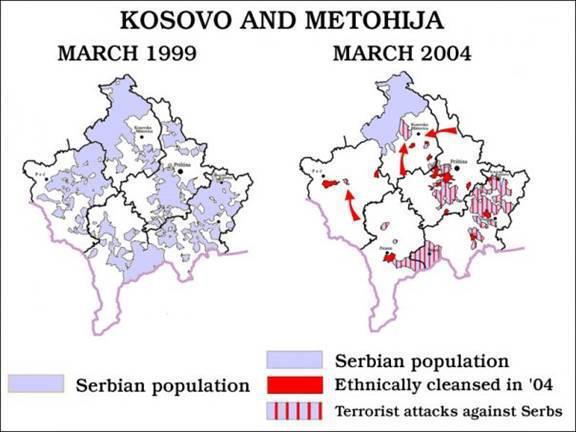
Originally published on 2019-10-01
About the author: Grey Carter is International Law graduate, Member of International Association of Scientific and Technical Translators of Serbia, FIT and EULITA member, freelancer, author
Source: Oriental Review
Origins of images: Facebook, Twitter, Wikimedia, Wikipedia, Flickr, Google, Imageinjection, Public Domain & Pinterest.
Read our Disclaimer/Legal Statement!
Donate to Support Us
We would like to ask you to consider a small donation to help our team keep working. We accept no advertising and rely only on you, our readers, to keep us digging the truth on history, global politics and international relations.
[wpedon id=”4696″ align=”left”]



